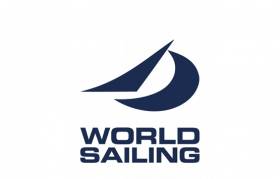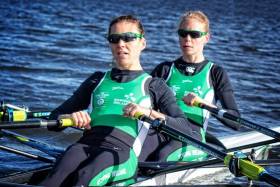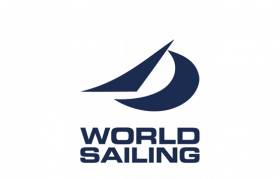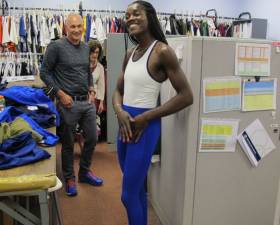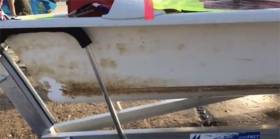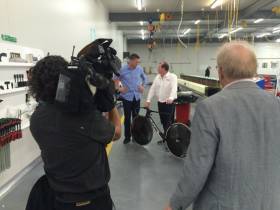Displaying items by tag: Olympics
Murphy Goes For Gold As Medal Racing Resumes In Rio
#Rio2016 - After yesterday's postponement of Annalise Murphy's Laser Radial medal race, this evening all Irish eyes will focus once again on the near-shore Pao de Azucar course – literal translation 'bread of sugar', better known as Sugarloaf, and so called because of its proximity to the iconic mountain that overlooks the natural harbour of Rio De Janeiro.
Using a two-round windward/leeward course with a leeward gate and final reach, race officers will target a 25-minute duration, half the scheduled time of races in the preliminary round.
Today’s forecast on this course is for light to moderate winds at the scheduled start time:

Laser
Finn Lynch’s Olympics finished with the final race in the preliminary series last Saturday, 32nd overall of the 46 competitors.
Rio was always going to be a dress rehearsal for the National Yacht Club sailor, whose real target is Tokyo in four years' time.
It’s not going to be an easy ride, however, as there is an emerging force of young Irish Laser sailors, inspired by Ireland’s recent performances, who will push hard for 2020 selection.
49er
The final three races of the qualification series are scheduled for today, and Irish duo Ryan Seaton and Matt McGovern will be looking to consolidate and hopefully advance towards medal positions prior to Thursday’s medal race.
Currently in fifth place, 12 points behind the Australians in the bronze medal position, the Ballyholme pair will need three good races to catch up.
The gold medal looks to be beyond the rest of the fleet as the ever-dominant New Zealanders Burling and Tuke look set to justify their pre-regatta favourites tag by securing the top honours before the medal race.
49erFx
Ireland's Andrea Brewster and Saskia Tidey will likely need three single-digit results today if they are to feature in Thursday’s medal race.
Lying 12th, but 21 points behind 10th place, the Royal Irish team have shown potential with a third and a couple of sixths in previous races.
The top of the fleet here is very close: only five point separate the top three, with hometown favourites Martina Grael and Kahena Kunze in the bronze position.
World Sailing Struggles With Presenting Rio Sailing Results
#Rio2016 - World Sailing continues to struggle with presenting the results of the Olympic Regatta.
The normally very efficient system that brings the World Cup results seems to have failed at a crucial moment.
The issue seems to be an inability to calculate the overall totals and sort them into leader order.
Interestingly, the workaround that World Sailing has put in place is to direct browsers to the official Rio results site.
Here, too, there are issues as this site does not show how discards figure in the overall total.
However, Afloat.ie has discerned that the World Sailing system seems to be operational again and can be accessed HERE.
Users are advised to save that link, as clicking on the other hyperlinks on this page may take you to the official Rio 2016 results site.
Protest decisions are also available through the same link. However, World Sailing fails to indicate which fleet the protest applies to, so there is a bit of guesswork involved in working out which event is affected by the protest.
Ireland Rowers Prepare for New Olympic Schedule
#Rowing: The two Ireland lightweight doubles will compete in their deferred heats tomorrow (Monday) at the Olympic Games in Rio de Janeiro. Under the new schedule put in place by Fisa, the lightweight women's double are set to go into action at 3.30 Irish time and the lightweight men at 3.50. The Sunday programme had to be cancelled because the course was not rowable.
#Rio2016 - World Sailing has provisionally confirmed six Russian sailors for the Olympic Games that kick off next Friday in Rio.
Following a conference call yesterday (Tuesday 26 July) with its board of directors in the wake of the damning McLaren report on doping in sport, the world governing body for sailing confirmed the eligibility of RS:X competitors Stefania Elfutina and Maksim Oberemko, 470 sailors Liudmila Dmitrieva, Alisa Kirilyuk and Denis Gribanov, and Laser helm Sergey Komissarov.
All six are currently in Rio preparing for the games.
Gribranov's sailing partner Pavel Sozykin was denied eligibility based on the findings of the McLaren report, but World Sailing has recommended that the Russian Olympic Committee will have the opportunity to nominate a last-minute replacement.
These provisional confirmations are subject to approval by the Court of Arbitration for Sport (CAS).
"The World Sailing board of cirectors carefully considered all relevant factors in making these determinations, including the guidance provided by the IOC, the results of the McLaren Investigation Report and our own rules and procedures," said Andy Hunt, World Sailing CEO.
"This is unprecedented territory for international sport as, collectively, we work to protect the integrity of sport and remain resolute in our commitment to eliminate doping. These efforts must be balanced with principles of fairness, due process and adherence to established rules.
"There is, however, no room in sailing for athletes who seek to gain an unfair advantage through the use of banned substances or who attempt to manipulate or subvert the anti-doping system. For World Sailing, there is no greater priority than protecting and preserving clean competition.”
The news comes after all but six Russian rowers were barred from the Rio games over the McLaren findings, as previously reported on Afloat.ie.
Anti-Microbe Suits No Match For Rio Pollution
#Rio2016 - Antimicrobial suits could be an answer to Rio 2016's pollution issues. But are they all they're cracked up to be?
Headlines have made much of the microbe-resistant properties of the new costumes designed for the US Olympic rowing team, as Ars Technica reports.
Comprising two layers, one to wick water from the skin and the other with an antimicrobial finish, the fabric is being talked up for its properties of protection against the water-borne pathogens in Guanabara Bay and the Rodrigo de Freitas lagoon – the latter where rowers will compete next month.
But the textile engineer behind the design says any such claims are "overblown".
Speaking to Vocativ, Mark Sunderland of Philadelphia University confirmed that the antimicrobial finish was an "afterthought" and comparable to athletic wear already on the high street.
Indeed, the primary benefit to rowers is the suit's seamless fit, covering less than half of the body – designed for comfort in high-performance conditions, not for health reasons.
Vocativ has more on the story HERE.
Slick Stains Boats In Rio Olympic Sailing Waters
#Rio2016 - Olympics organisers in Rio have a new headache alongside Zika concerns and rising crime – the city's sailing waters are turning boats brown.
After Chilean 49erFX squad Team Gumucio posted the above video to Facebook, further reports have emerged of sailors getting caught in an oil slick on Guanabara Bay.
"We've never seen anything like this. It was all over the place," Finnish sailor Camilla Cedercreutz told the Associated Press after the slick stained the white hull of her boat brown.
It appears sailors training in Rio's waters ahead of next month's Games now have to add industrial pollution to their list of issues with the Olympic aquatic venue on top of floating debris and high levels of pathogens.
Olympics 'Medal Moments' Marketed To RTÉ Advertisers
#Rio2016 - Tailored advertising spots to capture the spirit of success at next month's Olympics are now being offered by Ireland's national broadcaster.
According to The Irish Times, these branded "bespoke congratulatory messages" will feature in commercial breaks following any Irish medal win at Rio 2016.
In its pitch to prospective big-brand advertisers, RTÉ Media Sales have singled out sailors Annalise Murphy, Ryan Seaton and Matt McGovern as potential winners on the world's biggest sporting stage.
The Irish Times has more on the story HERE.
#VOR - A world-leading carbon fibre specialist and supplier of masts and rigging to the Volvo Ocean Race fleet has taken a spin at supplying wheels to New Zealand's Olympic cycling team.
Auckland-based Southern Spars is already a long-time supplier to Team New Zealand as it has been to the VOR, but this marks the first time they've developed technology for sporting use off the water.
“The collaboration with Cycling New Zealand has been about taking [our] expertise and applying it in a different context - working together to create a significant performance benefit," said Southern Spars director Mark Hauser.
“We have drawn on our years of experience in the design and manufacture of carbon fibre technology and components. This has led to high performance in yachting, as well as specialist knowledge of windage, stiffness, and strength.
"In doing this, we have designed a new, superior wheel, which we’re delighted to be supplying to the New Zealand track cyclists.
Hauser said he and the Souther Spars team are "very excited by the potential of the new wheels" which will have their first major showing on an international stage at the Rio games this August.
Crime Threat To Olympic Athletes As Rio Games Draw Near
#Rio2016 - “I don’t think the Irish media know how bad it is over here in Rio…” So Ireland’s Paralympian John Twomey emailed early this morning, as Afloat.ie's Tom MacSweeney writes.
He was reporting how “two good friends of mine who were in Kinsale for the Para Sailing Worlds in Kinsale in 2013” had been held up by two men, one of whom had a pistol, close to their hotel in Rio on Sunday morning. The Australian Sailing and Paralympic Committees have been told of the incident.
Liesl Tesch and team official Sarah Ross were confronted by two men while riding their bikes in a park near their hotel. One of the men was carrying a pistol and while both were threatened, the bikes were the only property stolen during the incident. Both members were unharmed, but shaken, and took part in racing at the 2016 Paralympic Games sailing venue later in the day.
“We were returning from a morning ride when the incident took place,” said Tesch. “We were close to our hotel when we were confronted by two men, one of whom was armed. I was threatened with the pistol and pushed to the ground.
“He took my bike, and the other perpetrator took Sarah’s bike. We are both shaken, but physically we’re both OK.”
Twomey commented: “These two ladies are good friends of mine and were in Kinsale for the Para Sailing Worlds in Kinsale in 2013. I don't think the Irish media know how bad it is over here in Rio. Perhaps you might keep people informed.”
Sailing teams and other athletes are gathering in Rio for final weeks of training and practice before the Olympics and Paralympics – and if they avoid any similar or even more serious brushes with criminal elements, they may be very lucky indeed.
The Sailing Anarchy website reports another incident when two Team GBR RIBs were stolen from Torben Grael’s Rio Yacht Club in Niteroi, which is reported to have been hit by stray bullets from a nearby gunfight in previous weeks.
Two British team coaches found the RIBs on a beach beach in Jurujuba, not far from the US team’s launching location.
Sailing Anarchy reports: “[The boats were found] as they were being stripped. Already VHFs, fuel hoses, tanks, and wiring were already gone, with outboards next to go. The GBR coaches immediate reaction was to threaten the thieves with calling the police. ‘You think that will help you?’ the head pirate said...
"One of the coaches surreptitiously snapped a pic of the pirates and the Rio Yacht Club staff identified one of them as a top drug dealer in the nearby Jurujuba favela, and told the coach he was very, very lucky.”
#Rio2016 - Calls from scientists to move this summer's Olympic Games in Rio over the outbreak of the Zika virus have been dismissed by the WHO, as BBC News reports.
As many as 150 international scientists and medical experts put their names to an open letter that claims the latest findings on the virus mean staging the event as-is would be "unethical".
The letter cites the failure of a programme by Brazilian authorities to control mosquitos that carry the virus, which has been linked to serious birth defects, as well as the country's "weakened" healthcare system as the outbreak spreads in South America, as reasons why hosting the games poses "an unnecessary risk" to the thousands of athletes and tourists set to arrive in Brazil two months from now.
However, the WHO – which has declared Zika as a worldwide health emergency – says moving or postponing Rio 2016 would "not significantly alter" the spread of the virus.
It's a stance supported by the head of the US Centers for Disease Control, Dr Tim Frieden, who said there is "no public health reason" to move the games – in the same week that the final on-site review of Olympic venue preparations took place.
Earlier this year it was reported that female athletes preparing for the Rio Olympics were advised to consider the risks involved before travelling to compete.
BBC News has more on the story HERE.



























